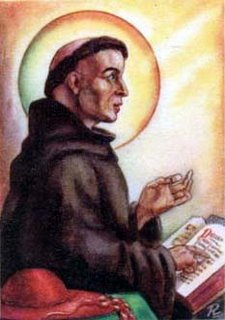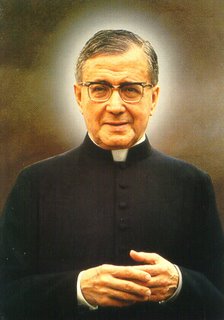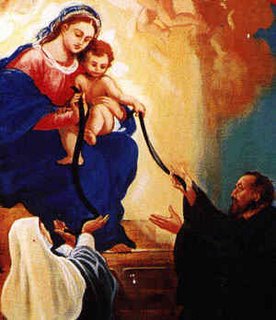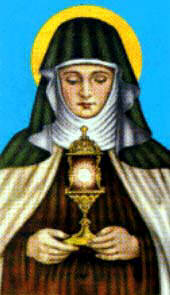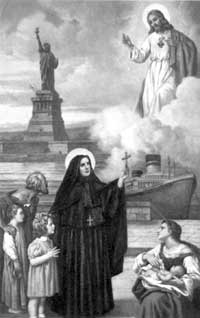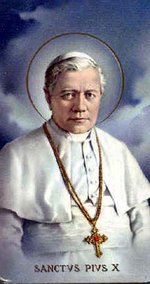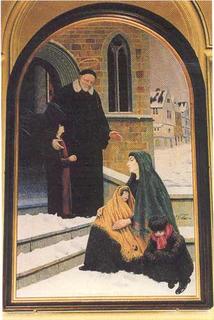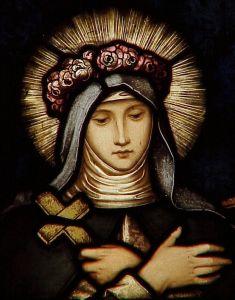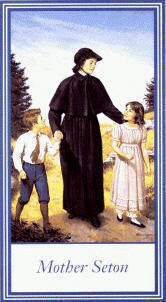
Elizabeth was born a Catholic at heart if not at birth. Her entire soul was consumed from an early age with a love of Jesus and a longing to live out the Gospel message in her own life.
Elizabeth Ann Bayley was born in the year 1774 in the city of New York, a place known for its shanty towns and roughened people many of whom had escaped impoverished conditions in their own place of birth and fled to America in order to begin again. It was also a time of tumult as revolution was whispered in quiet corners and anger gathered speed among American patriots at the hardheadedness of the English Government and its attempted subjugation of the America's.
Though for Elizabeth Ann the political maelstrom had not yet touched her personally, what did affect her life was the death of her beloved mother when Elizabeth Ann was only 3 years old. The heartache that Elizabeth Ann felt was not assuaged when her father remarried to a woman who had no affection for Elizabeth and her siblings.
Elizabeth Ann was fortunate in that her father was a well learned man who passed on his intellectual abilities to all his children. Elizabeth grasped the opportunity to open her mind and strengthen her learning capabilities as she grew more and more curious about the world around her. This would also help Elizabeth Ann cope as her father and step mother were having marital difficulties, as she threw herself into intellectual pursuits rather than fall prey to depression.
It was also during this time that Elizabeth became more reflective as she searched for the meaning of life and the purpose for which she had been born. Elizabeth's Ann prayer life became as important to her as was her studies, as she gained spiritual comfort in her constant prayer life. Elizabeth Ann like many others struggled to understand the vicissitudes of life as she grew strength from her natural surroundings her love of poetry which seemed to reflect her own inner searching and her love of music which lightened her heart. Rather than follow the path of many of her women contemporaries who also contemplated the meaningfulness of life Elizabeth did not go down the path of what many medical practitioners were giving their female patients and that was the dreaded Laudanum.
Finally in 1794 Elizabeth married William Magee Seton who like herself was an Episcopalian, the early years of the marriage were happy ones as Elizabeth gave birth to their five children. As Elizabeth wrote in her journal of her feelings for her husband, "It seemed that I loved him more than anyone could love on earth." Elizabeth's happiness seemed complete as both she and her husband lived devout lives within their Church community.
This happiness though would be interrupted upon the death of Williams father and the burden of caring for his siblings fell on Williams and Elizabeth Ann's shoulders as they struggled to keep the family business afloat. The inner strength that Elizabeth Ann had gone through when she was young now came to fruition as she helped her husband struggle to maintain his financial position whilst caring for his enlarged family. The burden though of being responsible for his entire family soon grew to heavy to bear and William became ill, in order to recuperate both William and Elizabeth set sail for Italy where they would stay with friends.
Though Elizabeth Ann had hoped that Italy would improve her husbands health the opposite occurred and William Seton died in Italy in 1803 this was a terrible blow to Elizabeth Ann as her heart was torn asunder at the loss of her beloved husband. Elizabeth Ann decided to spend time in Italy as she grieved the loss of her beloved William her faith became central to her spiritual wellbeing. Elizabeth stayed with her friends the Filicchi family who were devout Catholics, Elizabeth Ann whose own heart was in disarray soon gained comfort from the Faith shown by the Filicchi family and felt herself drawn to the deep spirituality and the comforting Traditions of the Catholic Church. What truly touched Elizabeth Ann's heart was the belief that Jesus was truly Present in the Eucharist and so this would set Elizabeth Ann on a journey from which she had no wish to return.
Upon returning to her native America Elizabeth Ann was confronted by her families opposition towards her ever deepening love towards the Catholic Faith and Elizabeth Ann from the depths of her heart poured forth these words in her journal, "If I am right Thy grace impart still in the right to say. If I am wrong Oh, teach my heart to find the better way." Through her continuing friendship with the Filicchi family Elizabeth Ann kept up a correspondence with Bishop's Cheverus and Carroll. The gathering storm in Elizabeth Ann's heart could not be quelled not even by her family nor her friends opposition and Elizabeth Ann embraced the Catholic Faith on Ash Wednesday in 1805.
As she embraced and lived with great joy the Catholic Faith Elizabeth Ann also had great difficulties placed in her path as many of her family and friends grew suspicious of the depth of love that Elizabeth Ann displayed to all about the Catholic Church. Many distrusted her influence upon their children and so though Elizabeth Ann attempted to start one school after another worried parents removed their children from Elizabeth Ann's influence. They could see that through this vibrant woman who emanated such joy and a deep feeling of empathy towards all she met that Elizabeth Ann's own personality would soon draw their children away from their Protestant backgrounds, as always fear shows a lack of trust in God's Divine Love.
Through all these trials Elizabeth Ann a most sensible woman did not lose her hope or her love for the Church, she would soon be joined by two of her family members, her sister in laws Cecilia and Harriet who also converted into the Catholic Faith. Because of the fears of many of her friends Elizabeth Ann decided to leave for Baltimore Maryland and start a school there so as to help the poor children overcome their impoverished circumstances and so live fulfilled lives. At the heart of Elizabeth Ann was charity, not in a lady bountiful way but of a charity of spirit which puts into practice that which is spoken of in the Gospels. Elizabeth Ann simply wanted to give, give and give in a practical and common sense manner and to live out the Tenets of her Faith, there was nothing to fear in a woman who was so in love with God.
In the year 1809 Elizabeth Ann Seton made her Vows of poverty, chastity and obedience as she began her first school and from hence forth would be known as Mother Seton. Elizabeth Ann's own winning personality soon draw more people into her school and so began her Order based on the one began by St. Vincent de Paul, they would call themselves ' The Sisters of Charity'.
Elizabeth Ann's life was not an easy one with the death of her beloved mother, followed by the death of one of her sister's. Then came the turning point when her beloved William succumbed with tuberculosis and died while they were in Italy which led Elizabeth on the path towards Catholicism and Sainthood.
From her beginnings of a reflective young lady to one of a mature and loving woman her love of God was never in question, she truly did live her belief in a merciful and loving Redeemer and shared this love with all she met.
Elizabeth Ann Seton died in 1821.
Saint Elizabeth Ann Seton was canonized in 1975 by Pope Paul VI.
Some Quotes
"We must pray without ceasing, in every occurrence and employment of our lives - that prayer which is rather a habit of lifting up the heart to God as in a constant communication with Him."
"The first end I propose in our daily work is to do the will of God; secondly, to do it in the manner he wills it; and thirdly to do it because it is his will."
"We know certainly that our God calls us to a holy life. We know that he gives us every grace, every abundant grace; and though we are so weak of ourselves, this grace is able to carry us through every obstacle and difficulty."
